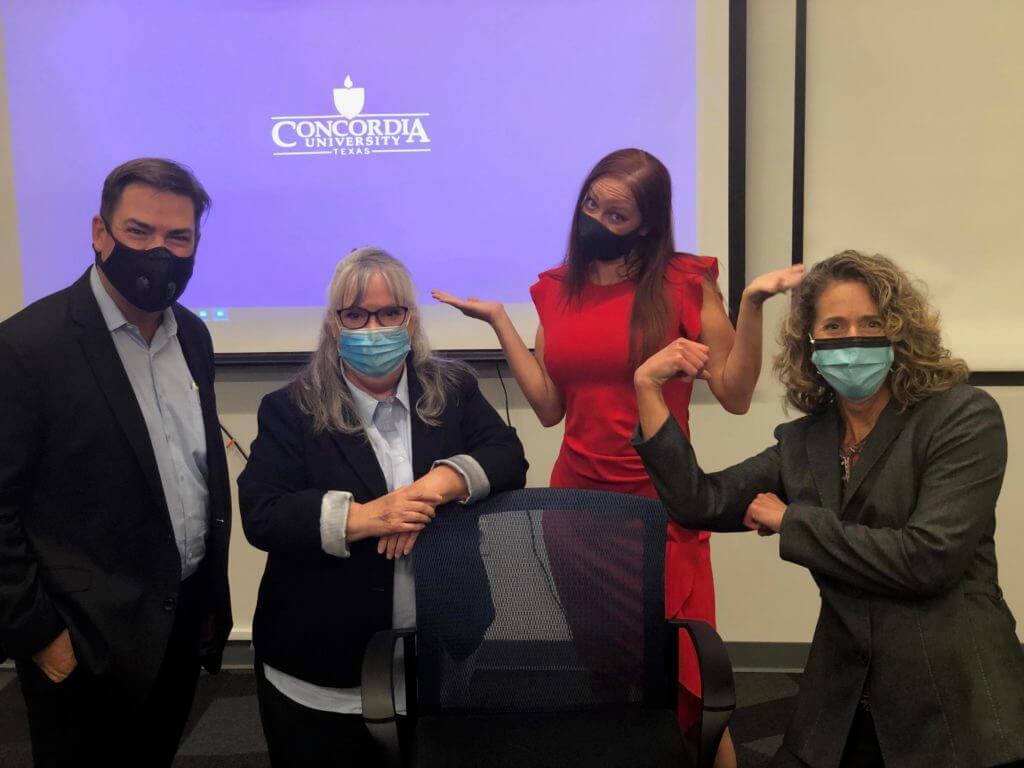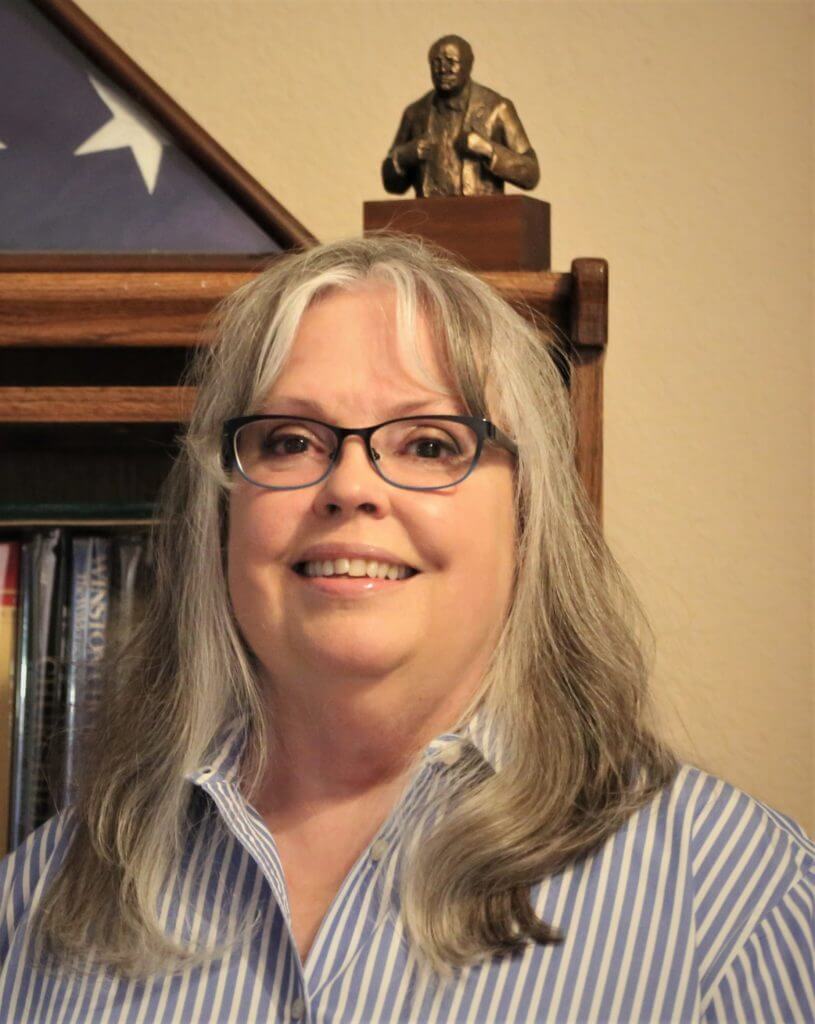
By LYNETTE HAALAND, Four Points News
The Austin City Council District 6 Candidates Educational Forum was held last week to help educate voters. Dee Harrison, Mackenzie Kelly and Jennifer Mushtaler attended the forum on Oct. 6 but incumbent Jimmy Flannigan was a no-show, notifying organizers 34 minutes before it began via email that he would not attend.
Forum moderator John Gillis Jr., a Four Points resident, was instrumental in creating the event that was hosted at Concordia University Texas. It was live streamed (https://youtu.be/pnQwTh_TErM).
“We need educated and informed voters,” Gillis said. “There are no sponsoring organizations and this is a learning event.”
Over the past month, Gillis contacted all four candidates via email at the same time and sent eight emails with confirmations. Two days before the forum, Flannigan’s campaign manager reached out to Gillis asking about the format of the forum. Then the night of the event, Gillis was notified by email that Flannigan was not coming a half hour before it started.

“I told him I was very disappointed and that I’d let everybody know the amount of communication, and as an incumbent, my disappointment of him no-showing to this educational format,” Gillis said.
For weeks Gillis collected many questions from community members and narrowed them down to seven. The three candidates, who did not know the questions in advance, were given one minute each to answer and the order of answering was rotated. Below are some of the questions and answers.
The candidates were introduced. Harrison, who is from Anderson Mill, is a retired State of Texas employee in emergency management. Kelly, who is also from Anderson Mill, is a retired volunteer firefighter and she manages a senior care agency. Mushtaler is an OB/GYN doctor in private practice and she lives in River Place and is the president of the River Place Limited District.
District 6 includes River Place, Grandview Hills, Preserve at Four Points, and a portion of Steiner Ranch and Comanche Trail, and other areas along Lake Austin and Lake Travis.
Representation
Geographically, District 6 is the largest of the 10 and the farthest from city hall with 38,000 housing units with 44 percent homeowners.

If elected, how would you provide effective representation?
“I’m used to answering quickly and timely with transparency,” Mushtaler said. “If the door’s open, come on in.”
“I’d start by showing up,” Kelly said. She answered six calls from people the day of the forum wanting to talk about things going on in the district. She said she would also keep the field office open that Don Zimmerman put into place. She drives by it now and too often it is closed.
“It is a full time position and should be treated as such,” Harrison said. She would have a lot of Zoom meetings until the pandemic passes but have the district office open during business hours.
Project Connect: comprehensive transit plan
On June 20, the Austin City Council approved a comprehensive transit plan called Project Connect, which was adopted by the CapMetro Board.
The initial investment would be $7 billion coming 55% from local and 45% from federal funding. Portions would be built over the next 13 years.
Proposition A is on the ballot for the $3.85 billion in local funding which would include a 4% increase or 8.75 cents per $100 valuation.
Currently District 6 has two MetroBus and two MetroExpress routes, a Lakeline Park & Ride and a Red Line commuter rail.
Do you support Project Connect, why or why not?
Kelly does not support Project Connect.
“It is a boondoggle for taxpayers,” Kelly said. “It’s too expensive… using antiquated technology. It’s not useful.”

Kelly said when she looks at the local rail system, hardly anyone rides. The area needs more bus lines, she said.
Harrison also does not support Project Connect, “We cannot afford it.”
“At this time with COVID-19, more people are working from home, telecommuting. We’re going to see a change in how people live, work. and play in Austin,” Harrison said.
Mushtaler does not support Project Connect either. She noted that this tax increase would appear on the 2021 property tax.
“Unfortunately for District 6 I think this leaves us distinctly disconnected,” she said. No improvements would be coming out to District 6 except a park and ride.
Mushtaler also is concerned with how this project could get implemented and get done fiscally responsibly. The initial project is contingent on federal funding that has not been secured.
Outdoor camping, homelessness
It has been 15 months since city council changed the policy on outdoor camping. Homelessness in the last year has grown 11 percent. It is ubiquitous in all public spaces across Austin, in parks, under underpasses, in caves. It is inhuman and possesses safety, fire and disease risks with violent crimes increasing within these encampments.
When city council rescinded the homeless camping laws in 2019, and there’s no regulations to control that, how is this vote beneficial to District 6? If elected, will you reinstate the camping ban, and if so, how would you go about clearing the camps respectfully? What do you propose for helping the homeless?
“I would advocate for repealing the repeal of the camping ban. Homeless camps as they exist right now are neither safe, they’re not secure, they’re not sanitary. They’re not a long term solution to an extremely complex problem. We have to provide housing and we have to provide services,” Harrison said.
She thinks the city needs to get ready because the eviction rate will likely go up as the pandemic continues to depress the economy.
“It is important to note that the homeless situation is very complex,” Kelly said. She thinks the council had a “knee-jerk reaction not driven by data or facts” to let people go out and sleep anywhere.
“I would work hard and advocate to put the camping ban back in place,” said Kelly, who was endorsed by the Fight For Austin PAC. She systematically would attack the reasons behind homelessness and work to get access to services.
“I would consider several locations… where they can camp,” Kelly said. “They take pride in their belongings and do not like the idea of shelters.”
“The homeless need love and support and community. I don’t want to criminalize people for being homeless,” Mushtaler said. She recalled her family experienced being homeless for a time when she was young after a flood in Houston where she grew up.
Mushtaler would work with private and public initiatives to “offer people a pathway and journey out… so they don’t slip back to homelessness.”
Refund or defund police
This summer the Austin City Council voted to reduce the Austin Police Department budget by $150 million. Compared to other large cities across the nation, this is the most substantial reduction to general fund police spending in percentage terms than any other city.
According to Bloomberg, roughly half of the large cities nationwide are increasing investments to the police and half are decreasing funds to police but nothing compared to some 33% that Austin has done. The next closest city to reduce the budget percentage-wise was New York City, which reduced by some 15%. Las Vegas and Arlington cut by some 7%, Washington D.C. by about 6%, and Baltimore, Philadelphia, Boston and Los Angeles by 4% or less.
Started on October 1, now the APD is operating at 2015 levels even with a drastically increased population. Cuts include 9-1-1 service, the forensic lab, internal affairs, traffic enforcement, police training, park patrols, etc. are affected as well as three cadet classes have been canceled.
How will we receive the police coverage in District 6 that we so desperately deserve? Do you want to defund the police or defend the police?
“I defend the police,” said Kelly, who is the only candidate who has gone through the 14-week APD Citizens Police Academy and understands what police officers go through every day.
“I fully intend on restoring funding to our police department, and fighting and advocating for that,” Kelly said. She thinks we need well trained officers to match our population and to have an external audit of training materials to show there is no racial bias.
Mushtaler said this is a concern for a lot of other neighborhoods outside of district 6, south, east, west and central. She would advocate for the training.
In 2012, voters voted to bond and approve the purchase of a northwest substation. It’s now 2020, the land is there and Mushtaler would advocate for the completion of the substation.
She would also advocate for the cadet classes and for training for the seasoned officers.
Harrison agrees.
“I am absolutely opposed to the defunding of the Austin Police Department. It’s an abomination,” Harrison said. She believes that the city’s trust with police officers is broken and not the force, the officers who lay their life on the line everyday to protect the community.
“They should be fully funded, all funding should be restored,” Harrison said.
District 6 road improvements
Capital Area Metropolitan Planning Organization or CAMPO had money dedicated to Anderson Mill and RM 620. It had been funded yet that money was taken to go to I-35 and the District 6 project deferred.
Along with that infrastructure issue, District 6 and RM 620 needs improved roads with the ongoing land development and with the wildfire risk that is ranked 5th in the nation.
Being notoriously behind in infrastructure planning, what is your position as the most cost effective, forward-thinking way to prepare now for the next 20 to 30 years of continued growth trends in Austin?
Mushtaler thinks we need to think about a modernized land development code, and that RM 620 is 15 to 20 years behind where it needs to be.
“I’ve been advocating that those projects should not be delayed. We do need to improve roads. Something’s gotta give,” Mushtaler said. She wants to work for safe and sustainable growth.
Kelly agreed that RM 620 has been a problem for many years. She cited the 2011 Steiner Ranch fire evacuations and the slow evacuation.
“If we had another incident like that in the wildland urban interface, the results could be catastrophic,” Kelly said. “We need better road improvements in the 620 and 2222 corridor as soon as possible.”
Best way to do that is to elect an advocate.
“We need to elect a new city council member to fight for the needs of our district,” Kelly said.
Harrison thinks the city needs to do a better job of looking at the next 5-years and the next 10-years and to take the vision in manageable bites.
She commented that 620 has been a nightmare since the 1980s when she moved to the area.
“Toll ways are not the answer. I will advocate for better service roads… not just in case of wildland fires but in case of any type of natural disaster,” Harrison said.

